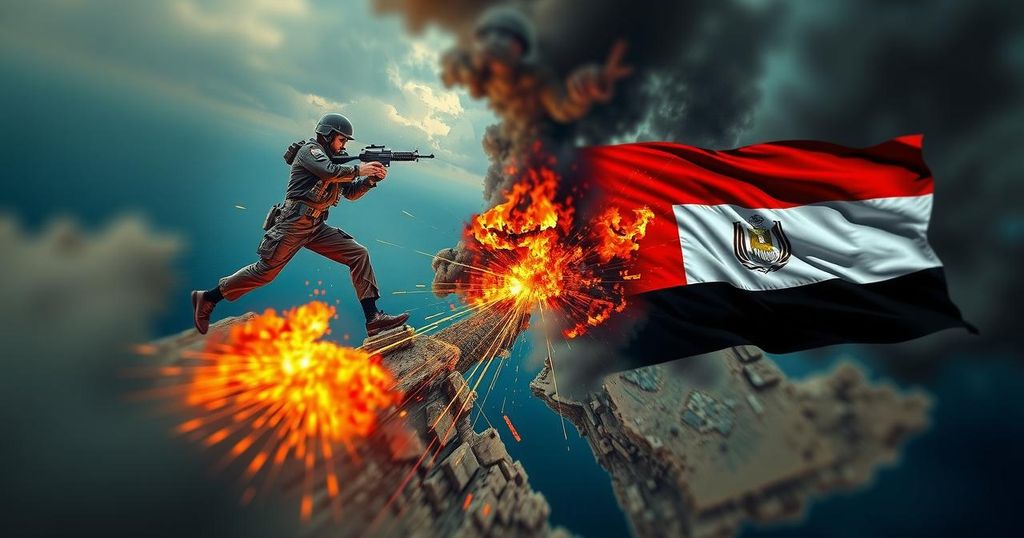Escalation of Violence in Gaza Amidst Palestinian Unity Discussions

Israeli military attacks on Gaza escalate as Hamas and Fatah discuss humanitarian issues in Egypt, while French DFM Sebastian Lecornu visits Lebanon amid concerns over Israeli ceasefire violations. Human Rights Watch highlights the need for accountability at the ICC. The conflict continues to highlight the urgent need for international attention to the plight of the Palestinian people.
Israeli forces have intensified their attacks on Gaza as Hamas and Fatah engage in discussions in Egypt over proposals concerning the reopening of the Rafah border crossing. The latest assault prompts a senior health official in Gaza to allege that Israel is employing weaponry that vaporizes victims’ bodies. Meanwhile, Lebanon’s media reports that French Defence Minister Sebastian Lecornu plans to visit Beirut to facilitate discussions on the enforcement of the truce with Hezbollah, amid rising tensions owing to Israeli violations of that ceasefire.
As violence continues, devastation in Gaza raises urgent questions about global awareness of the Palestinian plight. In an insightful conversation led by Marc Lamont Hill with Rashid Khalidi, an esteemed historian, they explore the historical context of this ongoing conflict and its implications for both Palestine and the broader Middle East.
In a statement prior to the ICC’s Assembly of States Parties in The Hague, Human Rights Watch urged member states to reinforce their commitment to international justice. The organization emphasized that arrest warrants issued against figures like Benjamin Netanyahu and Vladimir Putin highlight that accountability applies universally, regardless of political position.
Furthermore, recent reports from Lebanon indicate direct fire from Israeli forces targeting residences in Naqoura, with claims that Israel has breached the truce a staggering 52 times, raising fears about the fragile status of peace in the region. In Gaza, relentless bombardments persist, with reported attacks in several areas including Jabalia, Beit Lahiya, and southern Khan Younis, where civilians face dire conditions of fear and destruction.
Fatah representatives are in Cairo urging an end to Israeli aggression and advocating for swift humanitarian assistance and reconstruction in Gaza. They discuss Egyptian proposals aimed at facilitating the operation of the Rafah crossing, which remains closed due to the Israeli presence. This dialogue follows prior agreements made in China concerning Palestinian unity and governance plans for Gaza and the West Bank.
Additionally, a poignant highlight of the current humanitarian crisis came from a UN hearing where Dr. Tanya Haj-Hassan emotionally recounted the harrowing experiences of medical professionals in Gaza. At the same time, reports indicate that the US military successfully repelled missile and drone assaults initiated by Houthi forces, who claim such actions are in solidarity with Palestinians.
The article delineates the escalating military actions undertaken by Israeli forces against Gaza amidst ongoing discussions between Hamas and Fatah in Egypt regarding humanitarian and logistical issues. The backdrop includes international reactions and implications, particularly concerning the respect for ceasefires, war accountability, and humanitarian assistance. The historical context of violence against the Palestinian people underpins the current state of affairs, drawing attention to the significance of both local and global responses to the humanitarian crisis.
In summary, the situation in Gaza remains dire as Israeli military operations intensify, prompting critical international discussions on humanitarian access and accountability for war crimes. Fatah’s negotiations in Egypt underline an urgent need for unity among Palestinian factions, while the global community’s response, particularly regarding the ICC and ceasefire violations, remains crucial in addressing the looming humanitarian catastrophe. The course of the ongoing conflict will significantly impact both the region and international relations going forward.
Original Source: www.aljazeera.com








